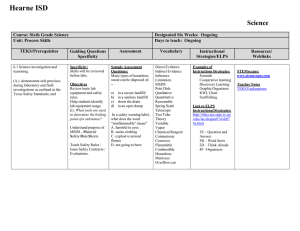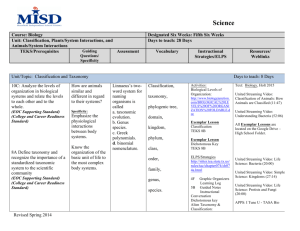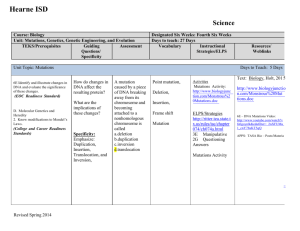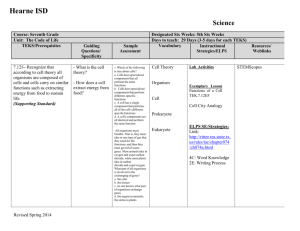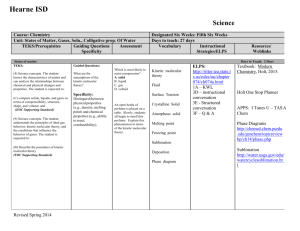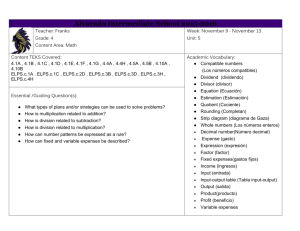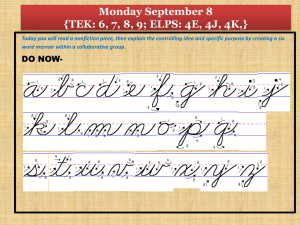Science - Cloudfront.net
advertisement
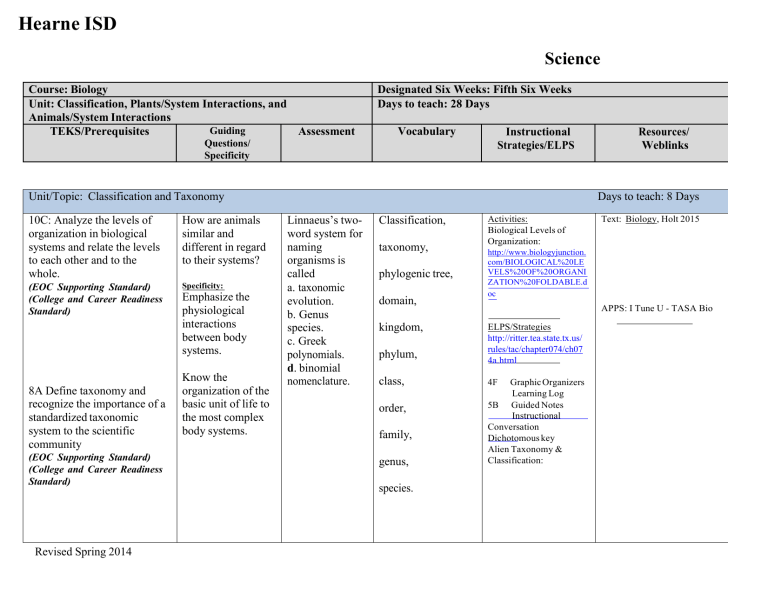
Hearne ISD Science Course: Biology Unit: Classification, Plants/System Interactions, and Animals/System Interactions Guiding TEKS/Prerequisites Assessment Designated Six Weeks: Fifth Six Weeks Days to teach: 28 Days Vocabulary Questions/ Specificity Instructional Strategies/ELPS Unit/Topic: Classification and Taxonomy 10C: Analyze the levels of organization in biological systems and relate the levels to each other and to the whole. How are animals similar and different in regard to their systems? (EOC Supporting Standard) (College and Career Readiness Standard) Specificity: 8A Define taxonomy and recognize the importance of a standardized taxonomic system to the scientific community (EOC Supporting Standard) (College and Career Readiness Standard) Revised Spring 2014 Emphasize the physiological interactions between body systems. Know the organization of the basic unit of life to the most complex body systems. Resources/ Weblinks Days to teach: 8 Days Linnaeus’s twoword system for naming organisms is called a. taxonomic evolution. b. Genus species. c. Greek polynomials. d. binomial nomenclature. Classification, taxonomy, phylogenic tree, domain, kingdom, phylum, class, order, family, genus, species. Activities: Biological Levels of Organization: Text: Biology, Holt 2015 http://www.biologyjunction. com/BIOLOGICAL%20LE VELS%20OF%20ORGANI ZATION%20FOLDABLE.d oc APPS: I Tune U - TASA Bio ELPS/Strategies http://ritter.tea.state.tx.us/ rules/tac/chapter074/ch07 4a.html 4F Graphic Organizers Learning Log 5B Guided Notes Instructional Conversation Dichotomous key Alien Taxonomy & Classification: Hearne ISD Science Course: Biology Unit: Classification, Plants/System Interactions, and Animals/System Interactions Guiding TEKS/Prerequisites Assessment Questions/ Specificity 8B Categorize organisms using a hierarchical classification system based on similarities and differences shared among groups (EOC Readiness Standard) (College and Career Readiness Standard) 8C Compare characteristics of taxonomic groups, including archae, bacteria, protests, fungi, plants and animals. (EOC Supporting Standard) E. Classification and Taxonomy 1. Know ways in which living things can be classified based on each organism’s internal and external structures development and relatedness of DNA sequences. (College and Career Readiness Standard) Revised Spring 2014 Designated Six Weeks: Fifth Six Weeks Days to teach: 28 Days Vocabulary Instructional Strategies/ELPS http://www.biologycorner .com/worksheets/pamisha n.html ELPS/Strategies http://ritter.tea.state.tx.us/ rules/tac/chapter074/ch07 4a.html 4K Draw & Write Discovery Learning Classification by Kingdoms Lab ELPS/Strategies http://ritter.tea.state.tx.us/ rules/tac/chapter074/ch07 4a.html 1C Graphic Organizers Guided Notes 4G Think, Pair, Share Visuals Resources/ Weblinks 8B – Classification Video: http://www.youtube.com/watch?v=b Z8AUcbZOLY&edufilter=_2nXFU MaB1_cnY78uKT5qQ 8B – Fungi Video: http://www.youtube.com/watch?v= w8M4hK57vxM&edufilter=_2nXF UMaB1_cnY78uKT5qQ 8B – Protist Video http://www.youtube.com/watch?v= W8nyX4lnXYY&edufilter=_2nXF UMaB1_cnY78uKT5qQ 8B – Animal Video: http://www.youtube.com/watch?v=a t4uTdp4Cxw&edufilter=_2nXFUM aB1_cnY78uKT5qQ 8B – Plant Video: http://www.youtube.com/watch?v= Mv97xCA7bAw&edufilter=_2nXF UMaB1_cnY78uKT5qQ 8B – Bacteria Video: http://www.youtube.com/watch?v= X32JZEkJAd0&edufilter=_2nXFU MaB1_cnY78uKT5qQ Hearne ISD Science Course: Biology Unit: Classification, Plants/System Interactions, and Animals/System Interactions Guiding TEKS/Prerequisites Assessment Designated Six Weeks: Fifth Six Weeks Days to teach: 28 Days Vocabulary Questions/ Specificity Unit/Topic: Plant Structure and Systems 10B: Describe the interactions What are the roles that occur among systems that of the various perform the functions of systems in plants? transport, reproduction and response in plants. What are the (EOC Readiness Standard) functions of stomata? Systems and Homeostasis 2. Describe, compare, and contrast structures and processes that allow gas exchange, nutrient uptake, and processing, waste excretion, nervous and hormonal regulation, and reproduction in plants, animals, and fungi, give examples of each. (College and Career Readiness Standard) Revised Spring 2014 Specificity: Emphasize parts of the plant and their individual functions Instructional Strategies/ELPS Resources/ Weblinks Days to teach: 8 Days How does transpiration move water through a plant? stomates (pl. stomata), guard cell, mesophyll, cuticle, monocot, dicot, xylem, phloem, vascular tissue, herbaceous plants, woody plants, turgor pressure Activities: Help Wanted-Plants: http://www.biologycorner .com/worksheets/helpwan ted.html ELPS/Strategies http://ritter.tea.state.tx.us/ rules/tac/chapter074/ch07 4a.html 2C 4G Word Knowledge Accountable Flower dissection lab Plant scavenger hunt Plant transpiration lab Laying the Foundation: Transpiration lab Hearne ISD Science Course: Biology Unit: Classification, Plants/System Interactions, and Animals/System Interactions Guiding TEKS/Prerequisites Assessment Designated Six Weeks: Fifth Six Weeks Days to teach: 28 Days Vocabulary Instructional Strategies/ELPS Comparative anatomy, organ, tissue, organ system, circulatory, excretory, reproductive, nervous, respiratory, digestive, endocrine, integumentary, immune. Activities: Skeleton and Organ Construction Questions/ Specificity Topic/unit: Animals and Animal System Interaction 10A: Describe the interactions How does the that occur among systems that digestive system perform the functions of affect excretory regulation, nutrient absorption, system? reproduction and defense from injury and illness in animals. (EOC Readiness Standard) Systems and Homeostasis 2. Describe, compare, and contrast structures and processes that allow gas exchange, nutrient uptake, and processing, waste excretion, nervous and hormonal regulation, and reproduction in plants, animals, and fungi, give examples of each. (College and Career Readiness Standards) How does the circulatory system affect the immune system? How do the various systems interact with one another? Resources/ Weblinks Days to teach: 8 Days Describe the interactions between the circulatory system and two other systems. ELPS/Strategies http://ritter.tea.state.tx.us/rul es/tac/chapter074/ch074a.ht ml 4F Accountable 2I Instructional Conversation 10A – Nutrient Absorption Revised Spring 2014 Hearne ISD Science Course: Biology Unit: Classification, Plants/System Interactions, and Animals/System Interactions Guiding TEKS/Prerequisites Assessment Questions/ Specificity Designated Six Weeks: Fifth Six Weeks Days to teach: 28 Days Vocabulary Instructional Strategies/ELPS Resources/ Weblinks http://www.educreations.com/les son/view/nutrientabsorption/2381060/?ref=appem ail 10A – Reproduction in Animals Video: http://www.educreations.com/les son/view/reproduction-inanimals/2383540/?ref=appemail 10A – Animal System Defense Video: http://www.educreations.com/les son/view/animal-defensesarticle/20451710/ 10A – Regulation Video: http://www.educreations.com/les son/view/b10aregulation/2390272/?s=IvDvPs &ref=appemail Revised Spring 2014
